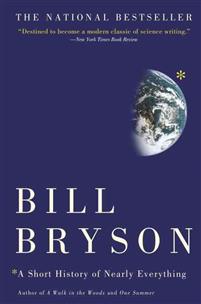A Short History of Nearly Everything by Bill Bryson (Quotes and Excerpts)
Thought-provoking quotes on the history of our universe and life itself by American author Bill Bryson, taken from his non-fiction bestseller A Short History of Nearly Everything
If you wish to read the book in its entirety, here is a link to amazon
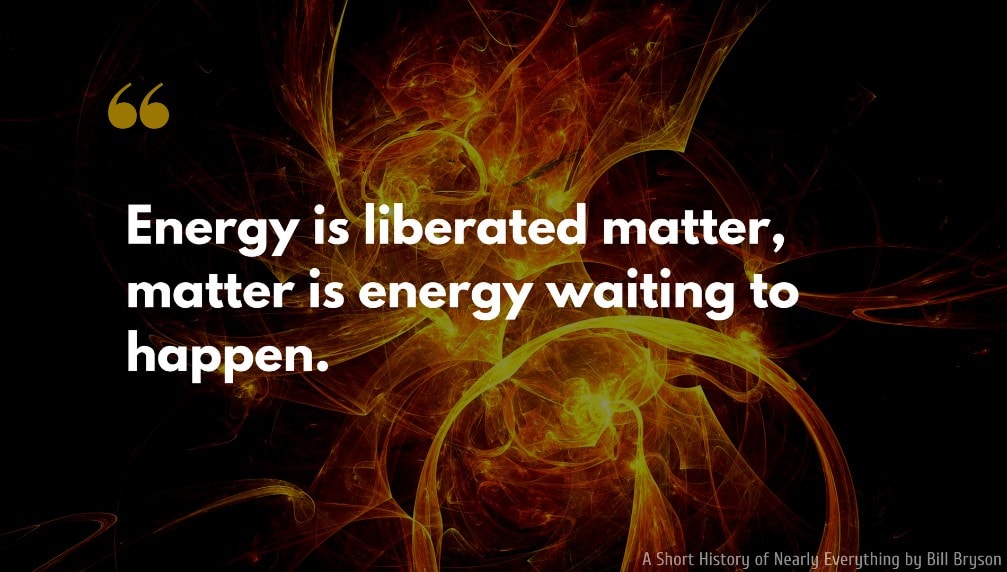
Energy is liberated matter, matter is energy waiting to happen.
Protons give an atom its identity, electrons its personality.
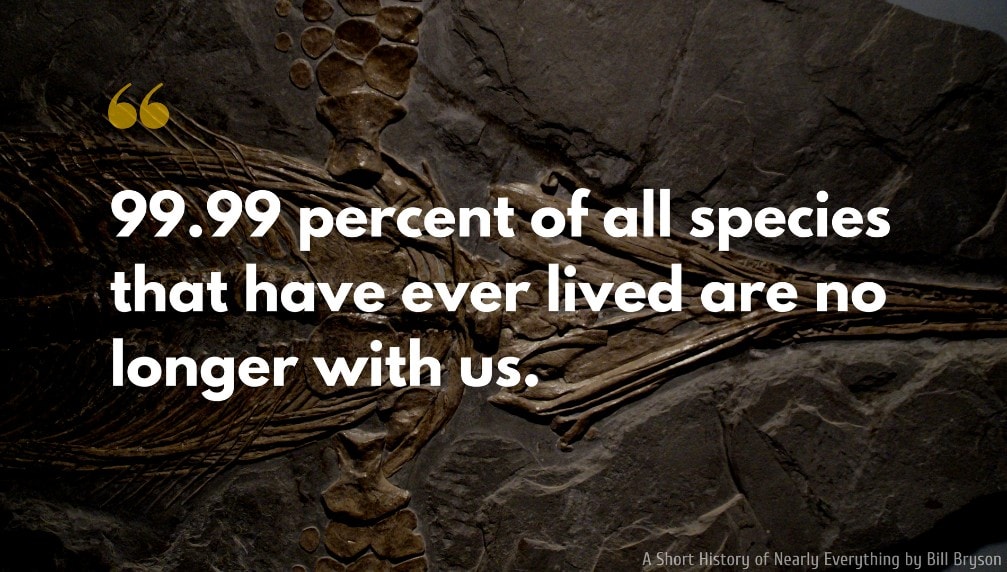
99.99 percent of all species that have ever lived are no longer with us.
There is more life under the Earth than on top of it
Life just wants to be; but it doesn't want to be much.
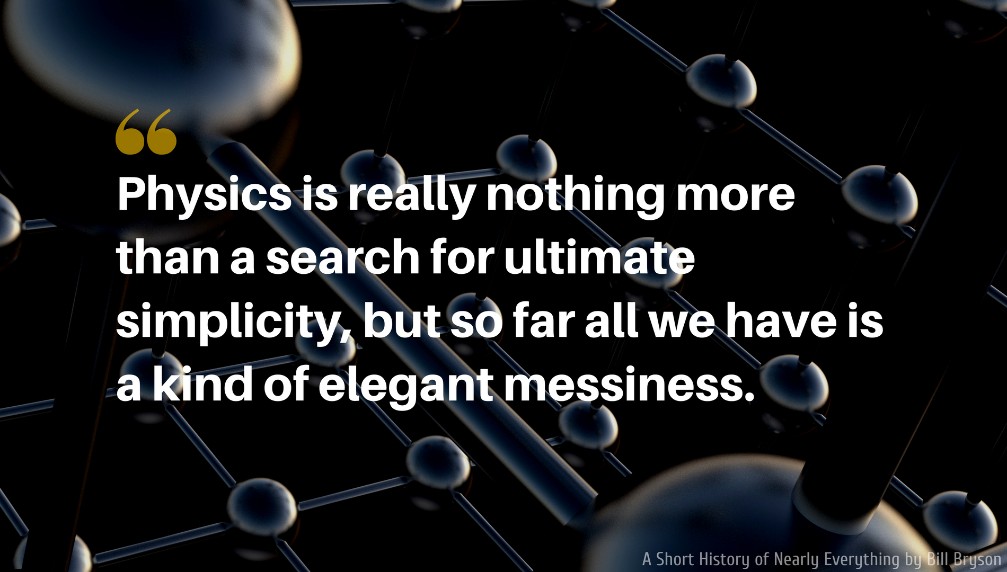
Physics is really nothing more than a search for ultimate simplicity, but so far all we have is a kind of elegant messiness.
It is a slightly arresting notion that if you were to pick yourself apart with tweezers, one atom at a time, you would produce a mound of fine atomic dust, none of which had ever been alive but all of which had once been you.
The upshot of all this is that we live in a universe whose age we can't quite compute, surrounded by stars whose distances we don't altogether know, filled with matter we can't identify, operating in conformance with physical laws whose properties we don’t truly understand.
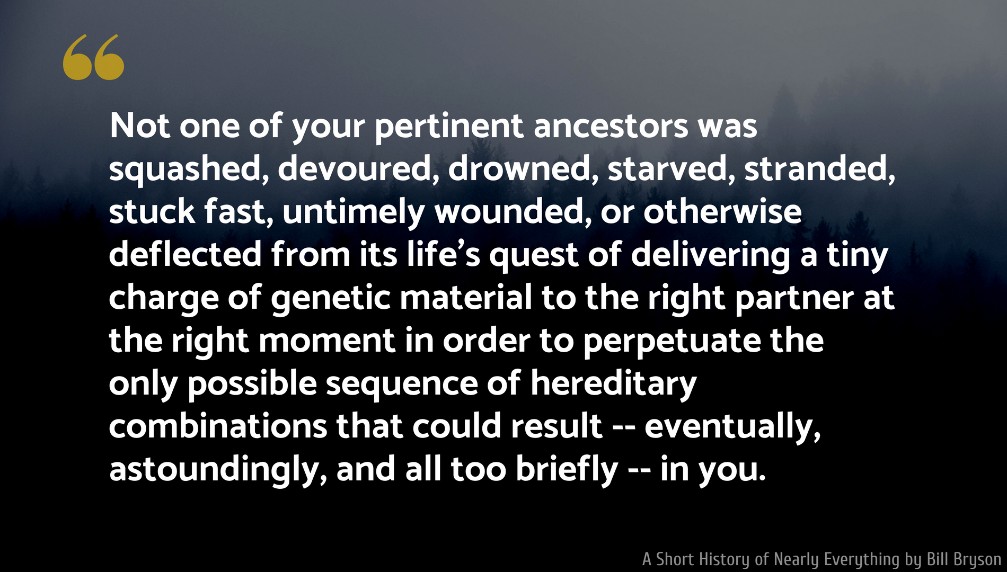
Not one of your pertinent ancestors was squashed, devoured, drowned, starved, stranded, stuck fast, untimely wounded, or otherwise deflected from its life's quest of delivering a tiny charge of genetic material to the right partner at the right moment in order to perpetuate the only possible sequence of hereditary combinations that could result -- eventually, astoundingly, and all too briefly -- in you.
It is easy to overlook this thought that life just is. As humans we are inclined to feel that life must have a point. We have plans and aspirations and desires. We want to take constant advantage of the intoxicating existence we've been endowed with. But what's life to a lichen? Yet its impulse to exist, to be , is every bit as strong as ours-arguably even stronger. If I were told that I had to spend decades being a furry growth on a rock in the woods, I believe I would lose the will to go on. Lichens don't. Like virtually all living things, they will suffer any hardship, endure any insult, for a moment's additions existence. Life, in short just wants to be.
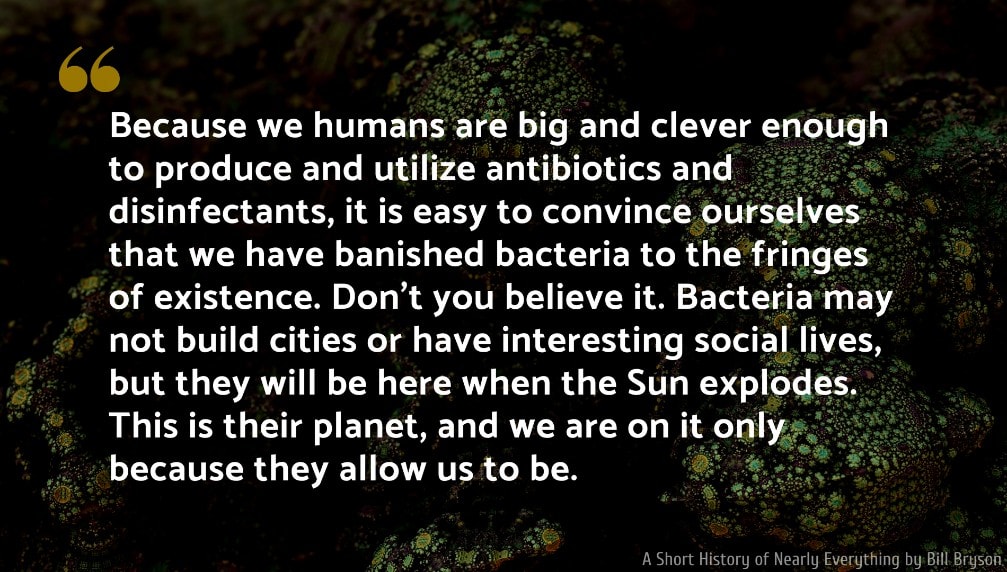
Because we humans are big and clever enough to produce and utilize antibiotics and disinfectants, it is easy to convince ourselves that we have banished bacteria to the fringes of existence. Don't you believe it. Bacteria may not build cities or have interesting social lives, but they will be here when the Sun explodes. This is their planet, and we are on it only because they allow us to be.
We now know that there are a lot of microbes living deep within the Earth… Some scientist now think that there could be as 100 trillion tons of bacteria living beneath our feet in what are known as subsurface lithoautotrophic microbial ecosystems… Thomas Gold of Cornell has estimated that if you took all the bacteria out of the Earth’s interior and dumped it on the surface, it would cover the planet to a depth of five feet. If the estimates are correct, there could be more life under the Earth than on top of it.
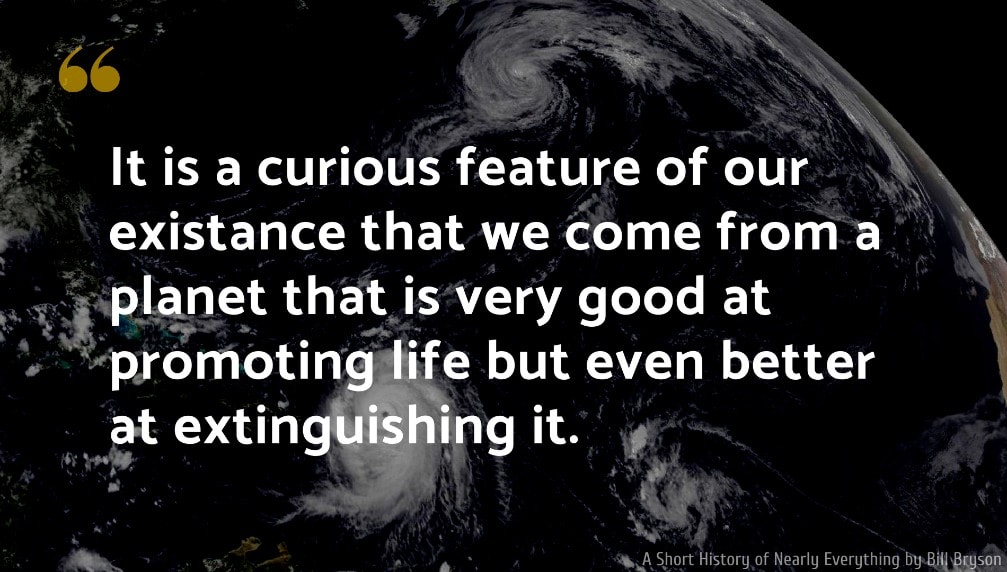
It is a curious feature of our existance that we come from a planet that is very good at promoting life but even better at extinguishing it.
There are three stages in scientific discovery. First, people deny that it is true, then they deny that it is important; finally they credit the wrong person.
People who are directly in a meteor’s path will not be killed by the impact. The compressed air in the path will heat up to 60,000 degrees Celsius, making them instantly vanish.
Tune your television to any channel it doesn't receive and about 1 percent of the dancing static you see is accounted for by this ancient remnant of the Big Bang. The next time you complain that there is nothing on, remember that you can always watch the birth of the universe.
Neutrons and protons occupy the atom’s nucleus. The nucleus of an atom is tiny -- only one-millionth of a billionth of the full volume of the atom -- but fantastically dense, since it contains virtually all the atom’s mass. As Cropper has put it, if an atom were expanded to the size of a cathedral, the nucleus would be only about the size of a fly -- but a fly many times heavier than the cathedral
You may not feel outstandingly robust, but if you are an average-sized adult you will contain within your modest frame no less than 7 X 10^18 joules of potential energy—enough to explode with the force of thirty very large hydrogen bombs, assuming you knew how to liberate it and really wished to make a point.
Disassemble the cells of a sponge (by passing them through a sieve, for instance), then dump them into a solution, and they will find their way back together and build themselves into a sponge again. You can do this to them over and over, and they will doggedly reassemble because, like you and me and every other living thing, they have one overwhelming impulse: to continue to be.
If this book has a lesson, it is that we are awfully lucky to be here-and by 'we' I mean every living thing. To attain any kind of life in this universe of ours appears to be quite an achievement. As humans we are doubly lucky, of course: We enjoy not only the privilege of existence but also the singular ability to appreciate it and even, in a multitude of ways, to make it better. It is a talent we have only barely begun to grasp.
If you imagine the 4,500-bilion-odd years of Earth's history compressed into a normal earthly day, then life begins very early, about 4 A.M., with the rise of the first simple, single-celled organisms, but then advances no further for the next sixteen hours. Not until almost 8:30 in the evening, with the day five-sixths over, has Earth anything to show the universe but a restless skin of microbes. Then, finally, the first sea plants appear, followed twenty minutes later by the first jellyfish and the enigmatic Ediacaran fauna first seen by Reginald Sprigg in Australia. At 9:04 P.M. trilobites swim onto the scene, followed more or less immediately by the shapely creatures of the Burgess Shale. Just before 10 P.M. plants begin to pop up on the land. Soon after, with less than two hours left in the day, the first land creatures follow.
Thanks to ten minutes or so of balmy weather, by 10:24 the Earth is covered in the great carboniferous forests whose residues give us all our coal, and the first winged insects are evident. Dinosaurs plod onto the scene just before 11 P.M. and hold sway for about three-quarters of an hour. At twenty-one minutes to midnight they vanish and the age of mammals begins. Humans emerge one minute and seventeen seconds before midnight. The whole of our recorded history, on this scale, would be no more than a few seconds, a single human lifetime barely an instant. Throughout this greatly speeded-up day continents slide about and bang together at a clip that seems positively reckless. Mountains rise and melt away, ocean basins come and go, ice sheets advance and withdraw. And throughout the whole, about three times every minute, somewhere on the planet there is a flash-bulb pop of light marking the impact of a Manson-sized meteor or one even larger. It's a wonder that anything at all can survive in such a pummeled and unsettled environment. In fact, not many things do for long.

